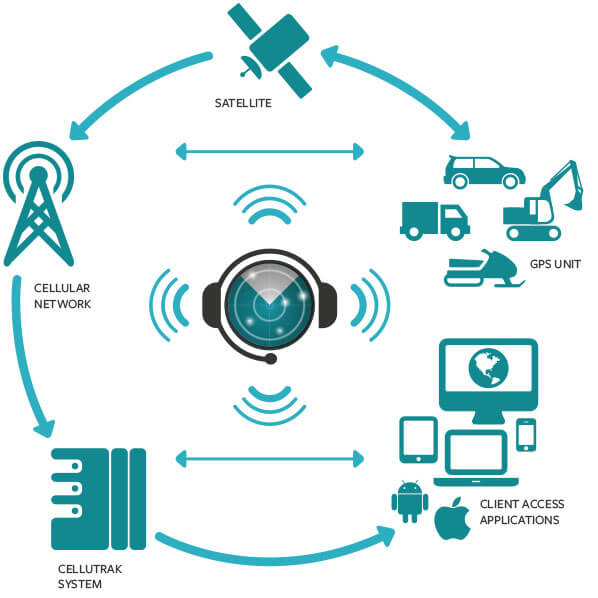![]()
Photo by 500photos.com at Pexels
Safety and efficiency – that has long been the priority for fleet managers regarding their drivers while on the road. However, that often meant relying on outdated methods such as paper maps and verbal directions.
These days, thanks to advances in GPS fleet tracking technology, fleet managers have more advantages when managing their vehicles. There are several key benefits of GPS tracking when it comes to fleet management which we explore in this blog.
What is GPS Tracking?
GPS is short for Global Positioning System. It is a technology that uses a network of satellites to calculate the precise location of an object on Earth. This information can then be used to track the object's movements.
GPS tracking is commonly used for navigation and tracking purposes.
Advantages of GPS Tracking in Fleet Management
Fleet managers can use GPS tracking devices installed in vehicles to keep track of their movements in real-time. The GPS tracking devices transmit the location data of the vehicles to a central server. Fleet managers can then access this information via a web-based platform or mobile app.
When compared to analog and traditional tracking methods, GPS asset tracking systems have several advantages, such as:
1. Cost effectiveness
Perhaps the biggest advantage of GPS tracking for fleet management is that it is a cost-effective solution. For a relatively affordable, monthly subscription fee, GPS Tracking devices can reduce costs by providing actionable data that can be used to optimize routes, reduce maintenance costs and improve fuel efficiency.
When compared to the cost of traditional methods such as paper maps and toll calls, GPS tracking represents a significant saving. According to the Environmental Protection Agency, fleets can save over $6,000 a year per vehicle by reducing idling time.
GPS tracking systems also report vehicle conditions in addition to location. By using these solutions to monitor vehicle performance, fleet managers can regulate idling time and other cost-incurring actions.
2. Improved driver safety
Innovative GPS tracking companies have built-in driver behaviour technology.
When fleet managers can see the real-time location of their drivers, they can quickly identify any potential hazards or risks. Businesses can use driver report cards to adjust and improve behaviors to avoid hazardous driving. This also reduces the risk of accidents on the road.
For example, if a driver is speeding or making sudden turns, the fleet manager can be alerted and take action to correct the situation.
3. Enhanced customer service
There is always a learning curve to implementing a new technology, having 24/7 customer support can help ease this transition. Equipping your vehicles with GPS devices enables you to serve your customers well.
Say your customer wants to know the status of their delivery. The dispatcher can quickly check the GPS tracking data to see exactly where the driver is and provide an estimated arrival time.
With this information, companies can call customers to inform them about delays. Additionally, if the company is billing by the hour, GPS tracking data can accurately show the time a technician reported to work and the time they left.
Customers highly appreciate this type of proactive customer service. It helps build brand reliability and loyalty.
4. Boosted employee productivity
GPS tracking plays an important role in improving employee productivity. A GPS tracking system can optimize the route if employees are required to make multiple stops during their workday. This ensures that workers spend the minimum amount of time driving between stops.
In addition, GPS tracking data can be used to identify employees who may be slacking off or taking longer breaks than they are supposed to. Fleet managers can then take appropriate action with data to back them up.
5. Reduced fuel consumption
Reports show that a heavy-duty truck idles for 1800 hours per year, using around 1,500 gallons of diesel. This shows just how much money your company wastes annually on excessive fuel.
GPS tracking systems usually provide idling alerts.
6. Decreased maintenance costs
This is another significant advantage of GPS tracking for fleet management. By monitoring the health and performance of your vehicles, you can identify potential issues early and take action.
For example, if a vehicle is consistently running hot, the fleet manager is alerted and takes action to have the vehicle serviced. This can help to avoid more serious issues, such as engine failures, which could result in costly repairs.
GPS tracking data can also be used to create maintenance schedules for each vehicle. This ensures that vehicles are properly serviced and helps to extend their lifespan.
7. Reduced paperwork
GPS solutions also reduce paperwork for fleet managers. Previously, all data – such as mileage, fuel usage, and service records – would be recorded manually on paper. But with GPS tracking, fleet managers can monitor these metrics digitally. This makes it easier for them to generate reports and track trends over time.
Additionally, managers can integrate tracking systems with other software, such as those for accounting and invoicing.
8. Reduced insurance costs
One of the best ways to reduce insurance-related costs is to install a GPS tracking system. Insurers often offer discounts to companies that use GPS tracking, since it improves safety and mitigates risks.
In addition, GPS tracking data can be used to identify high-risk drivers. By taking action to address these issues, companies can further reduce their insurance costs.
GPS Tracking for Fleet Assets
GPS fleet tracking solutions offer numerous advantages to businesses with fleets of vehicles in service. From reducing accidents and paperwork to improving employee productivity, using GPS tracking to monitor your assets makes your business more efficient and profitable.
If you’re looking for asset tracking solutions built for fleets and trusted by the armed forces, explore Cellutrak’s GPS tracking solutions. Using their all-in-one tracking devices, your business becomes more reliable, safe, and systematic. Contact Cellutrak today and schedule a live product demonstration!



